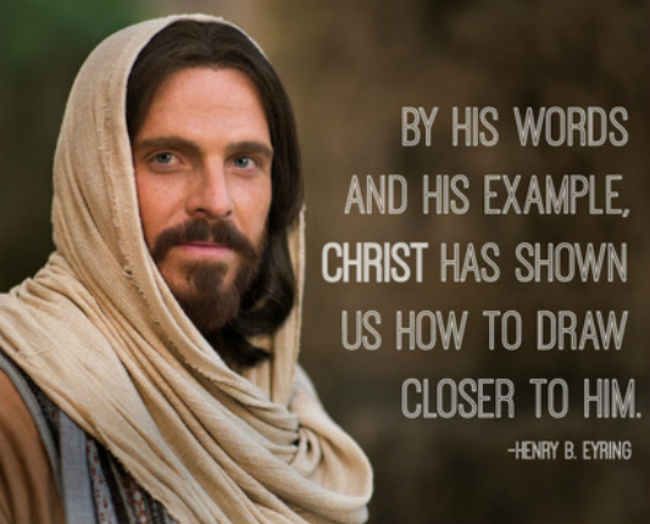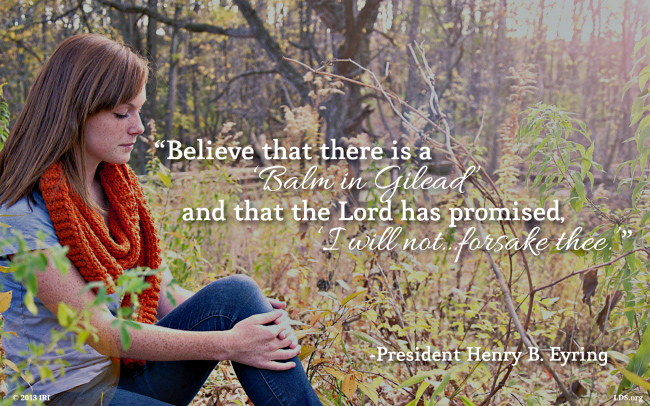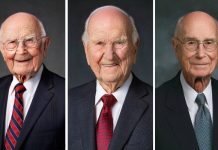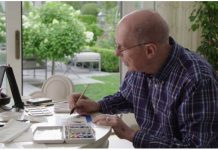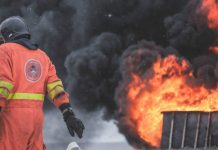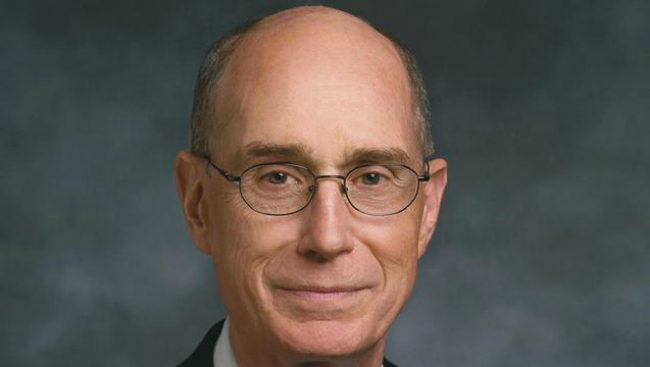
I arrived a few minutes early. I’d felt compelled to attend Elder Henry B. Eyring’s lecture on author C. S. Lewis. It was March 30, 1995, a few weeks before I graduated from Brigham Young University. I remember the hour vividly.
Elder Eyring walked into the fairly sparsely populated lecture hall. I’ve always admired his quick smile and the sparkle in his eyes when he speaks. As he approached the pulpit, he looked burdened. He introduced himself and began his lecture. Of course, he spoke eloquently, but I quietly concluded that something intense occurred in his life.
Two days later with millions of Latter-day Saints at General Conference, I sustained Elder Henry B. Eyring as an Apostle, Seer, and Revelator.
Born in Princeton, New Jersey, May 31, 1933, Henry Bennion Eyring was the second of three sons of Henry and Mildred Bennion Eyring.
Home Life and Education
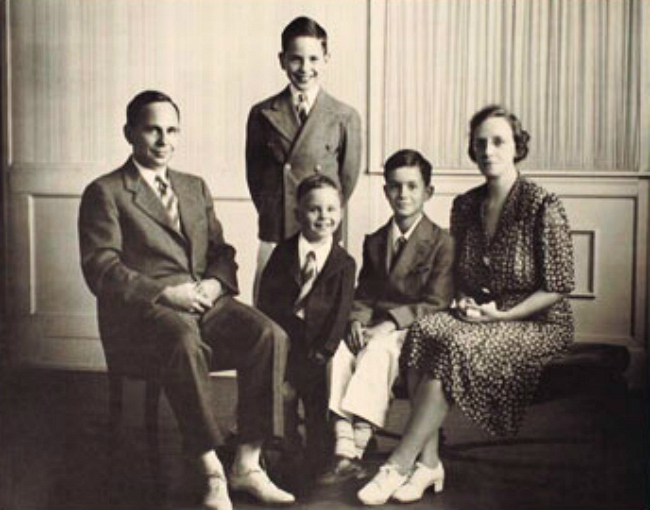
The senior Henry Eyring was an accomplished and internationally known scientist before his son was even born, winning many major awards in chemistry and coming close to the Nobel Prize. Mildred was head of the women’s physical education department at the University of Utah and was pursuing a doctorate degree at the time they met.
President Eyring remembers a home filled with ideas where there were black boards in the basement instead of ping pong tables. “We’d talk about spiritual things, we’d talk world affairs, we’d talk about history,” he recalls, “So the dinner table was the most interesting place you’ve ever been in your life. Here are these brilliant people talking, but not trying to be brilliant.”
It was in this laboratory of a home where President Eyring learned to cherish learning, and where his dad taught that science and religion were not mutually exclusive.
“He figured God was the Creator, his own science was just a poor approximation of trying to understand what the Lord did,” President Eyring says of his father. “He never found any conflict at all of any kind and we never felt any. … Dad’s idea was if you live a decent life and have the Holy Ghost and you’re fairly intelligent, you’ll find the truth one way or another.”
“I grew up with the idea that you could be very, very good at what you did and not take it too seriously. And so Dad never had any pretense, as friendly as could be, would meet ordinary people and treat them as if they were his equal, at least. I can remember one time, I asked him, ‘Dad, why do you ask gas station attendants questions?’ And Dad said, ‘I never met a man I couldn’t learn something from.’”
World renowned scientist Henry Eyring strongly encouraged his sons to study physics, believing that technical advances would require fluency with physics and mathematics.
President Eyring shared a defining conversation with his father while studying physics at the University of Utah.
He asked his father for help with a complex mathematical problem. “My father was at a blackboard we kept in the basement,” Elder Eyring recalls. “Suddenly he stopped. ‘Hal,’ he said, ‘we were working this same kind of problem a week ago. You don’t seem to understand it any better now than you did then. Haven’t you been working on it?’ ”
A little chagrined, Hal admitted he had not. “You don’t understand,” his father went on. “When you walk down the street, when you’re in the shower, when you don’t have to be thinking about anything else, isn’t this what you think about?”
“When I told him no,” Elder Eyring concludes, “my father paused. It was really a very tender and poignant moment, because I knew how much he loved me and how much he wanted me to be a scientist. Then he said, ‘Hal, I think you’d better get out of physics. You ought to find something that you love so much that when you don’t have to think about anything, that’s what you think about.’ ”
Elder Eyring actually received a BS degree in physics from the University of Utah and then shifted his focus to his passion to being an educator. He went to Harvard and earned Masters and Doctoral degrees in Business Administration. He began his career as an assistant professor at the Stanford Graduate School of Business.
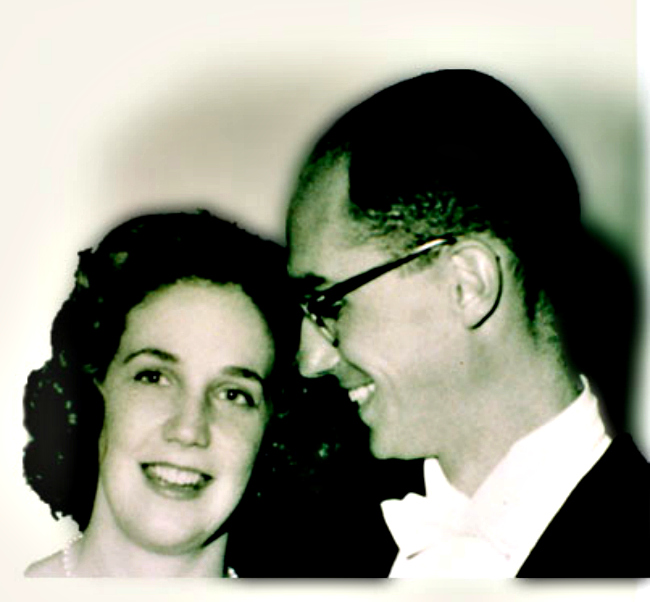
He met his wife, Kathleen Johnson, while in Boston. Of her, Elder Eyring said,
“She has been a person who has always made me want to be the very best that I can be.”
President Eyring would make a new visual aid every day for morning scripture study. He would dabble with his children in watercolors and in the kitchen baking bread. He said, “I was trying to give them a feeling of their own capacity to do things and that the gospel was at the center of things.”
The Eyrings have four sons and two daughters.
Elder Eyring’s Service
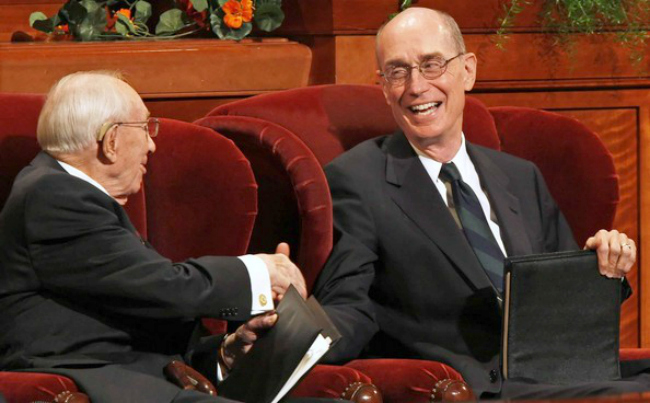
Henry B. Eyring spent two years in the U.S. Air Force at Sandia Base, New Mexico.
He served as regional representative, bishop, member of the Sunday School General Board, and twice as Commissioner of Church Education. He became the president of Ricks College (now Brigham Young University-Idaho) from 1971-1977. He served with Presiding Bishop Robert D. Hales as a counselor from 1985-1992. He was a member of the First Quorum of the Seventy from 1992-1995.
On April 1, 1995, Henry B. Eyring was sustained to the Quorum of the Twelve Apostles. He became the Second Counselor in the First Presidency on October 6, 2007, after the death of James E. Faust. After the death of Gordon B. Hinckley, he was called and set apart as the First Counselor to President Thomas S. Monson on February 3, 2008.
Elder Eyring’s Ministry
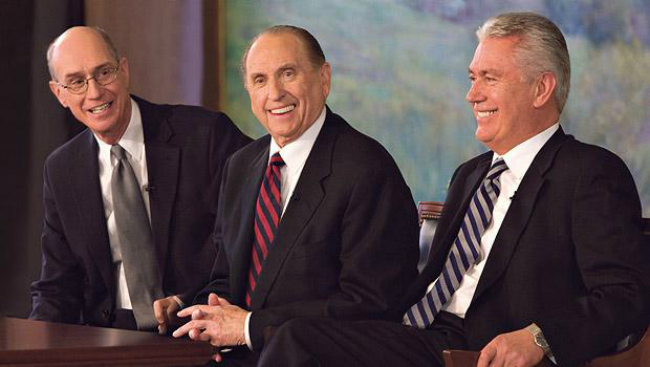
Soon after his call as an Apostle, Elder Eyring related,
“The Lord has allowed me to see the Church from the viewpoint of so many of our members,” he says. “I didn’t grow up in a large ward and stake. My first experiences with the Church were in a tiny branch, a family setting. As a district missionary while in the Air Force, I was able to work on the Indian reservations. When I went to Harvard, it too was a district. It was not made a stake until just after I left. Then in my work with the Church Educational System, I meet people who are truly dedicated to the Lord and to his kingdom. I can’t think of a more helpful preparation for a calling to the apostleship than that.”
And now that he has had a month or two of service in his new calling, what are his thoughts about being an Apostle? He answers without hesitation, “I feel a greater and greater need each day for the Lord’s help as I strive to serve in this sacred position.”
Elder Eyring’s ministry follows his pattern of teaching his children—“I was trying to give them a feeling of their own capacity to do things and that the gospel was at the center of things.” Elder Eyring’s discourses focus on man’s relationship with Jesus Christ. He testifies of divinity and of man’s capability to seek and receive revelation from God.
Memorable Quotes of Elder Eyring:
“Your life is carefully watched over, as was mine. The Lord knows both what He will need you to do and what you will need to know. He is kind and He is all-knowing. So you can with confidence expect that He has prepared opportunities for you to learn in preparation for the service you will give. You will not recognize those opportunities perfectly, as I did not. But when you put the spiritual things first in your life, you will be blessed to feel directed toward certain learning, and you will be motivated to work harder. You will recognize later that your power to serve was increased, and you will be grateful” (Education for Real Life, 2002).
“Whether or not you choose to keep your covenant to always remember Him, He always remembers you” (Always Remember Him, 1999).
“Every person is different and has a different contribution to make. No one is destined to fail” (Help Them Aim High, 2012).
“Carrying a grudge is a heavy burden. As you forgive, you will feel the joy of being forgiven. At this Christmastime you can give and receive the gift of forgiveness. The feeling of happiness that will come will be a glimpse of what we can feel at home together in the eternal home for which we yearn” (Home for Christmas, 2009).
“When you walk in the light, you will feel some of the warmth and the happiness that will finally be yours when you are welcomed home again with the hundreds and perhaps thousands of others whom you will bring with you, who have walked in the light because you did” (Choose Higher Ground).
“[The Relief Society] is composed of women whose feelings of charity spring from hearts changed by qualifying for and by keeping covenants offered only in the Lord’s true Church. Their feelings of charity come from Him through His Atonement. Their acts of charity are guided by His example—and come out of gratitude for His infinite gift of mercy—and by the Holy Spirit, which He sends to accompany His servants on their missions of mercy. Because of that, they have done and are able to do uncommon things for others and to find joy even when their own unmet needs are great” (The Enduring Legacy of Relief Society, 2009).
“You may have had an earthly parent who thought that you could be better than you thought you could be. I had such a mother.
“What I didn’t know when I was young was that my Heavenly Father, your Heavenly Father, sees greater potential in His children than we or even our earthly mothers see in us. And whenever you move upward on that path toward your potential, it brings Him happiness. And you can feel His approval.
He sees that glorious potential in all of His daughters, wherever they are. Now, that puts a great responsibility on each of you. He expects you to treat every person you meet as a child of God. That is the reason He commands us to love our neighbors as we love ourselves and to forgive them. Your feelings of kindness and forgiveness toward others come as your divine inheritance from Him as His daughter. Each person you meet is His loved spiritual child.
As you feel of that great sisterhood, what we thought divides us falls away. For instance, younger and older sisters share their feelings with the expectation of being understood and accepted. You are more alike as daughters of God than you are different” (Daughters in the Covenant, 2014).
“When our children were very small, I started to write down a few things about what happened every day. Let me tell you how that got started. I came home late from a Church assignment. It was after dark. My father-in-law, who lived near us, surprised me as I walked toward the front door of my house. He was carrying a load of pipes over his shoulder, walking very fast and dressed in his work clothes. I knew that he had been building a system to pump water from a stream below us up to our property.
He smiled, spoke softly, and then rushed past me into the darkness to go on with his work. I took a few steps toward the house, thinking of what he was doing for us, and just as I got to the door, I heard in my mind—not in my own voice—these words: “I’m not giving you these experiences for yourself. Write them down.”
I went inside. I didn’t go to bed. Although I was tired, I took out some paper and began to write. And as I did, I understood the message I had heard in my mind. I was supposed to record for my children to read, someday in the future, how I had seen the hand of God blessing our family. Grandpa didn’t have to do what he was doing for us. He could have had someone else do it or not have done it at all. But he was serving us, his family, in the way covenant disciples of Jesus Christ always do. I knew that was true. And so I wrote it down, so that my children could have the memory someday when they would need it.
I wrote down a few lines every day for years. I never missed a day no matter how tired I was or how early I would have to start the next day. Before I would write, I would ponder this question: “Have I seen the hand of God reaching out to touch us or our children or our family today?” As I kept at it, something began to happen. As I would cast my mind over the day, I would see evidence of what God had done for one of us that I had not recognized in the busy moments of the day. As that happened, and it happened often, I realized that trying to remember had allowed God to show me what He had done.
More than gratitude began to grow in my heart. Testimony grew. I became ever more certain that our Heavenly Father hears and answers prayers. I felt more gratitude for the softening and refining that come because of the Atonement of the Savior Jesus Christ. And I grew more confident that the Holy Ghost can bring all things to our remembrance—even things we did not notice or pay attention to when they happened.
My point is to urge you to find ways to recognize and remember God’s kindness. It will build our testimonies. You may not keep a journal. You may not share whatever record you keep with those you love and serve. But you and they will be blessed as you remember what the Lord has done. You remember that song we sometimes sing: “Count your many blessings; name them one by one, And it will surprise you what the Lord has done.”
Tonight, and tomorrow night, you might pray and ponder, asking the questions: Did God send a message that was just for me? Did I see His hand in my life or the lives of my children? I will do that. And then I will find a way to preserve that memory for the day that I, and those that I love, will need to remember how much God loves us and how much we need Him. I testify that He loves us and blesses us, more than most of us have yet recognized. I know that is true, and it brings me joy to remember Him” (O Remember, Remember, 2007).


